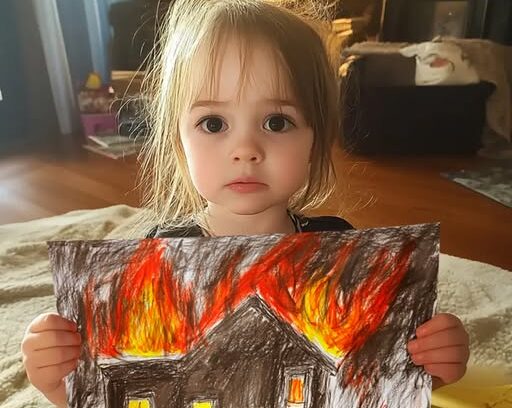When her daughter exhibits unusual behavior, Jennifer questions everything. Eventually, Emma tells her the truth — that she found a box of her father’s secrets.
My daughter, Emma, has always been the rainbow child, wearing the brightest colors and drawing unicorns and butterflies.
But recently, there has been a change in her behavior. She’s been withdrawn, hasn’t been eating properly, and always wants to sit outside.
At first, I didn’t think much about it because Emma constantly goes through phases. But then, her teacher, Mrs Silverton, called me in for a parent-teacher meeting. She was just in kindergarten, but the school prided itself on checking in with parents.
“I didn’t want to alarm you, Jennifer, but there’s something concerning going on with Emma.”
She pulled out a yellow file and showed me a series of drawings by Emma — all dark and shadowy, menacing even.
I drove home from the school in silence. I knew that something was different with Emma, but I didn’t think it was that bad.
Later, while I made noodles for our dinner, I decided to talk to Emma about it.
“Sweetheart,” I said. “I went in to see Mrs Silverton today.”
“Really? Why?” she asked curiously.
“She spoke about the new drawings you’ve been doing and how different they are from the usual ones.”
She looked at her bowl of noodles, twirling her fork through it — her response was silence.
Finally, she spilled the beans.
“I found Daddy’s secret,” she said quietly.
“What secret, honey?” I asked her.
“Come, I’ll show you, Momma,” she said, jumping up from the table.

William, my husband, lives with Emma and me only part-time because of his job. Sometimes, he must work away from home, and traveling always gets to him. So, he decided to rent an apartment for when he worked away.
When Emma led me to William’s home office, I wondered what my daughter had discovered.
I watched as she went to William’s desk and opened the top drawer, taking out an old box.
“I saw this when I came looking for crayons,” she said.
Emma gave me the box before bolting to her room.
The moment I glimpsed inside, my entire world crumbled.
Inside were photos — images of William hugging another woman and a set of three beautiful children, aged between two and seven years old.
My emotions somersaulted from shock to betrayal to raw heartbreak.
Beneath the photos was a little notebook with numbers scribbled in them. It seemed like a replica of my notebook in my handbag with all the emergency numbers ready.
I knew that I needed to confront William but I didn’t know how to deal with the entirety of the situation. I just knew that Emma needed some stability. It was affecting her already.
I returned everything to the box and stored it on the desk.
As I left the room, I found Emma standing in the hallway, her eyes wide with worry and confusion.
“Let’s get you to bed,” I said. “I promise you, everything is going to be just fine.”
I dropped Emma off at school and then went back home. I took another look at the small book and called Mia, the woman in the photographs. I pretended to be their son’s teacher.
As betrayed as I felt, everything was seamless, thanks to William’s little notebook.

“Hang on,” Mia told me. “Speak to husband, William.”
I heard William’s voice on the phone, confirming my worst fears. I hung up immediately.
As the hours dragged on and the time to pick Emma up edged closer, I needed to do something. I needed some answers before I looked at Emma’s precious little face.
I picked up the phone again, called Mia, and told her everything.
She was just as shocked as I was and revealed that she didn’t know about Emma and me.
Next, I called my lawyer — I needed to end my marriage to William. Emma deserved better. Mia deserved better, and so did her children. I deserved better, too.
A few weeks passed, and Mia came over — we sat and spoke for hours and uncovered the truth — William had just used the both of us, keeping our families in different towns to keep us from finding out about each other.
My lawyer took over for Mia and me, ensuring we would get justice. We also wanted the four kids to get to know each other as siblings — because the children were siblings regardless of what was happening.
Ultimately, we united against a man who manipulated our lives, unveiling a story more convoluted than any soap opera plot.
Our lawyer ensured that we got alimony from William — although we could never figure out how William had managed to marry both of us — and kept the lie going for so many years.
I’ve also gotten Emma into therapy to ensure that my daughter was healing from this traumatic experience. But if I’m being honest, I think the best therapy was Emma getting to know her half-siblings.
My Daughter Kept Taking an Extremely Heavy Backpack to School – I Realized Why When I Finally Met Her Bus Driver
Life as a single mom in the suburbs is a tightrope walk between joy, coffee, and juggling acts. I’m Juliet, a financial advisor, striving to build a career robust enough to secure a bright future for my nine-year-old daughter, River.
Since my husband deserted us and fled to a new state when River was only a toddler, the brunt of parenting fell solely on my shoulders. “At least this way,” my mother said, feeding River, “you don’t have to worry about your daughter learning Richard’s lying and cheating ways. She’s all yours, and you can mold her in the way you want.”
A few weeks ago, we were sitting down to dinner together, and River began telling me all about the latest news at school. She went into a whole explanation of after-school clubs and felt that she should join.
“Okay,” I said, pleased by her growing interest in school activities. “What are you thinking about? Drama? Art?”
River sat and thought about it for a minute, picking at her broccoli.
“I think Art club,” she said.
“We’ll go out and buy art supplies tomorrow,” I promised.
“I’m so excited about this!” River gushed.
I couldn’t mask my relief that River would have something constructive to occupy her time while I was still at work.

One morning, River, brimming with newfound responsibility, declared that she wanted to pack her own lunches to foster her independence. I was standing at the counter sorting out River’s breakfast of cereal and juice while starting her lunch for the day.
“Mom, I think I should start packing my own lunches,” she stated firmly, watching me add her things to her sandwich.
“That’s a great idea, River. I’m so proud of you for taking this step,” I said, encouraging her self-reliance. “But you’ll have to ask me for help when it comes to knife things.”
Our routine continued like clockwork. We had breakfast together, and I walked River to the front of our yard, where the yellow school bus picked her up.
But a few days ago, something changed.
As we got to the bench my father had installed in our yard, I asked River to put her backpack down so I could help her into her jacket.
Moments later, as I pulled the jacket closed, a slight wince escaped her when I tapped her back.
“What’s wrong?” I asked immediately.
River shrugged her shoulders and dismissed it as the weight of her schoolbooks causing discomfort, but the mother in me stirred with worry.
“Are you sure you’re okay? That seemed like it hurt,” I probed, concern lacing my tone.
“It’s just the books, Mom,” my nine-year-old said. “They’ve been really heavy this week,” she brushed off, avoiding my gaze.
“Do you want me to take you to school, then?” I asked her as I checked my watch for the time.
“No, thank you,” River said, as the bus honked around the corner.
Driven by concern and curiosity, I got to my office and called the school.
“No, Juliet,” the secretary said. “We don’t allow the kids to take textbooks home because of how heavy they are. So, they use them at school only.”
Then what was River taking to school?
I decided to leave work early. I wanted to pick River up and talk with her about whatever was going on.
River was a responsible child, and I knew that she wouldn’t be doing anything wrong. But if she was hurting herself in some way, I needed to understand why and what was going on with her.
I parked next to a school bus and waited to see River run out. I followed her to the school bus that did our route and caught a snippet of conversation between River and the bus driver.
“Did she like everything?” River asked the driver.
“She loved it!” the driver said. “Are you sure that it’s okay that you’re bringing things for my Rebecca?”
“Yes,” River said. “As long as Rebecca is happy.”
Who is Rebecca? I wondered to myself.
“River!” I called as other students started to get on the bus.
“Mom!” she exclaimed when she saw me. “What are you doing here?”
“I left work early,” I told her, ready to take the immovable boulder that had been her backpack on her shoulders, which was now suddenly light as air.
“Honey, where are all your things?” I asked.
River hesitated as we walked to the car.
“I’ll tell you at home,” she said.
Taking her hands in mine, I knelt to her level.
“Tell me what’s going on. You can tell me anything, River. And you can trust me,” I encouraged her, trying to soothe her distress.
Through tears, River told me everything.
The new bus driver with whom she had made fast friends had a daughter who was battling leukemia.
“I saw her photo next to the steering wheel, Mom,” River said. “Mr. Williams makes me sit on the seat behind him because I’m so small. So when I saw the photo, I asked him who the girl was.”
I sat back and let River continue. She needed to let the story out—and feel seen and heard.
“Mr. Williams said that Rebecca is only two years younger than me, and that she hasn’t been in school at all. Because she’s stuck in the hospital.”
I nodded.
“So, when we got the art supplies for school, I took two of everything so that I could make a pack for Rebecca, too. And even the clothes, because she said that the hospital is so cold.”
“You’ve spoken to Rebecca?” I asked.
“Yes,” River said, tears streaming down her face again. “Mr. Williams has been taking me. I don’t go to any after-school clubs.”
River sucked in her breath and held it until I spoke.
“Oh, baby,” I said. “You should have told me.”
I was torn between admiration and fear for her safety. We agreed to meet Mr. Williams at the hospital later in the evening. And upon meeting him, his sincerity and gratitude washed away my fears.
“Thank you for allowing and supporting River in this,” Mr. Williams thanked me, assuming that I had been aware of River’s actions.
“Your daughter is wonderful, Juliet,” he said.
“Thank you,” I said. “I would love to do more.”
Mr. Williams smiled at me and led us down a hallway to Rebecca’s room. The rest of the day was spent in laughter and shared stories as River and Rebecca played in the hospital room, their joy echoing off the walls.
Watching them, I realized that my daughter had taught me a valuable lesson in compassion, one that I would cherish and nurture as she continued to grow.

